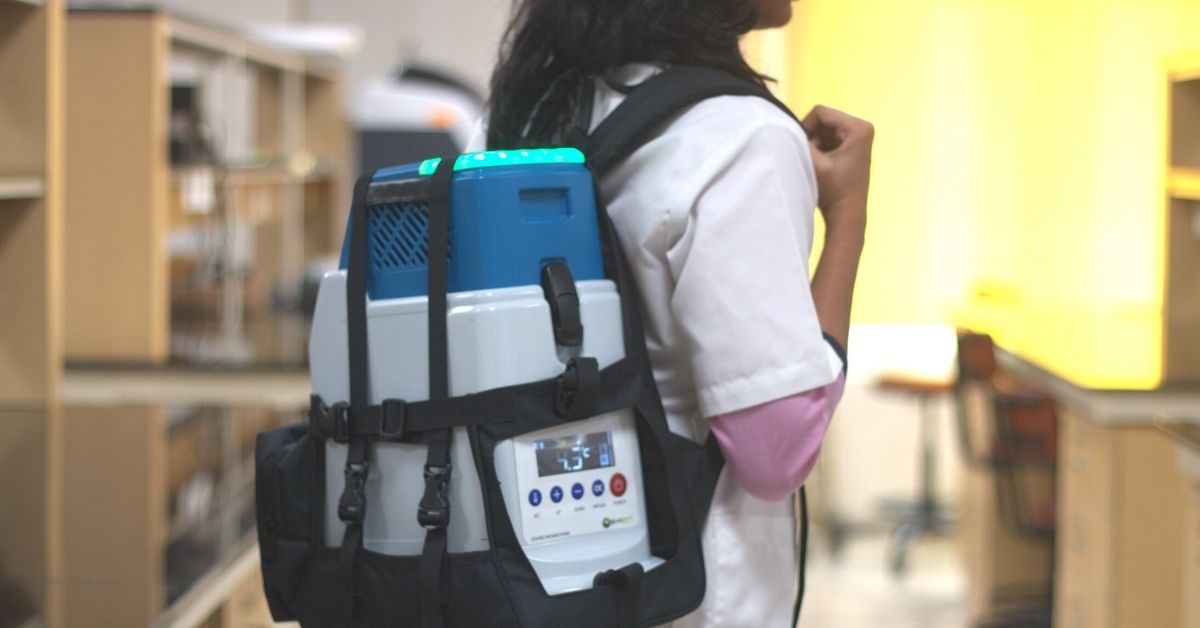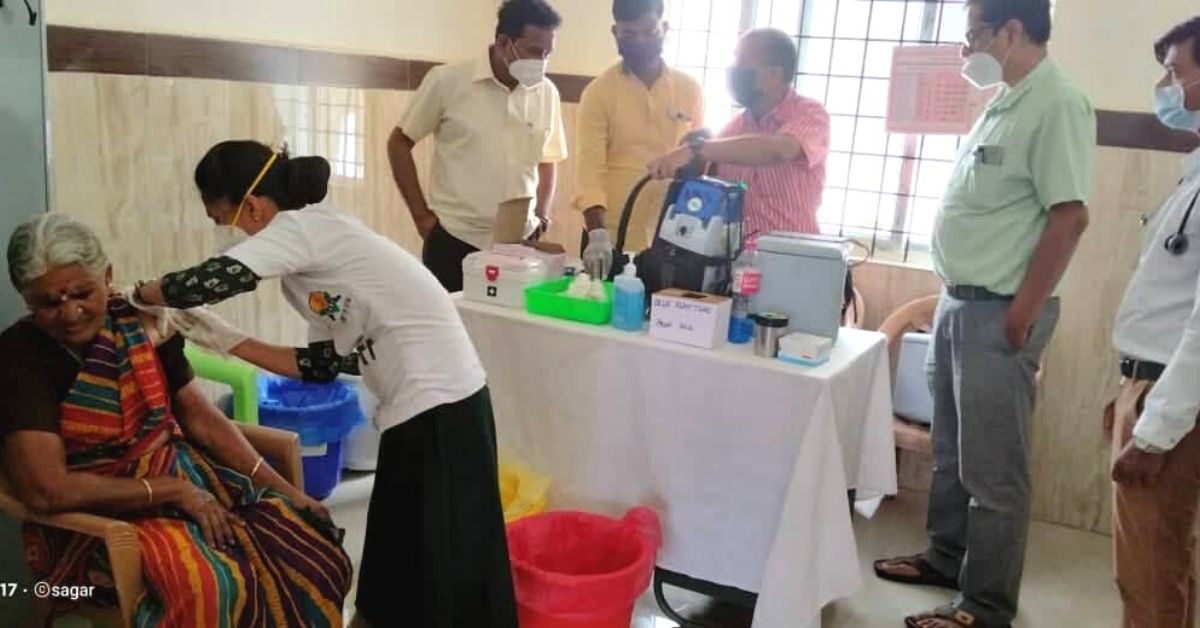The COVID-19 pandemic has made us more aware about the insights into the medical field that would have otherwise gone unnoticed. One of these insights is vaccine wastage. A recent report says that some states registered wastage of COVID-19 vaccines as high as 37 per cent.
Though, it may sound like a relatively new concept, which is disheartening given the country is reeling under acute shortage, vaccine wastage is a common phenomenon and concerns all types of vaccines. Recent estimates presented by the Immunization Technical Support Unit (ITSU) of the Indian Health Ministry show that 25 per cent of all vaccines are wasted each year.
To solve this problem, a Manipal-based startup has come up with an innovative device — Emvolio, a portable battery-powered refrigeration unit that ensures the preset temperatures are maintained for up to 12 hours.
“The reason for such large wastage is due to the poor, suboptimal, cold-chain management practices. The vaccines are to be kept and maintained at certain temperatures for their effectiveness. The vaccines cannot be frozen or kept at non-optimal temperatures as it results in spoilage,” says Mayur Shetty, CEO and founder of Blackfrog Technologies Pvt Ltd.

Citing an example of the COVID-19 vaccines, he says, “Both Covaxin (BBL) and Covishield (AZ) need to be stored in temperatures between 2℃ and 8℃, and are freeze-sensitive.
Mayur tells The Better India that it becomes a challenge to maintain optimal temperatures at all times until the products are delivered, especially when it comes to reaching the remotest parts of India.
The 28-year-old explains, “There is heavy reliance on the traditional method of using iceboxes to provide last mile vaccine transportation. The system is ill-equipped for such logistical use as the temperature cannot be regulated, and accidental freezing or thawing may render the temperature-sensitive vaccines inefficacious.”
Each Emvolio device can accommodate 30 to 50 vials, a standard capacity to carry for a daylong immunisation drive. The device comes loaded with features like temperature monitoring, location tracking, checking battery health, live tracking, and displaying vial status. It is also solar compatible.
Maximising vaccine use up to 99%
The device has patented technology involving precision cold-chain and vaccine traceability systems with support from Biotechnology Industry Research Assistance Council (BIRAC). The company has developed it with the leading impact investors, including Venture Centre at National Chemical Laboratory (NCL), Pune, and Social Alpha.
Explaining its functionality, Mayur says the technology ensures that the contents in the cold chamber are surrounded by a blanket of temperature-controlled air. “A refrigeration solid-state cooling mechanism uses Proportional Integral Derivative (PID) controller which maintains the precise temperature and eliminates the risks of cross-contamination or emitting noxious refrigerant leak. It has no moving parts or motors, which guarantees low-maintenance cost,” he adds.
Mayur says the overall arrangement ensures that no hot or cold spots exist within the chamber and the temperature is uniform all around. “Another added feature is the minimal freeze-thaw cycles. It means that every time the lid opens to retrieve the vial, the contents get exposed to the ambient air. The in-built rapid cooling technology helps bring the cold chamber back to the required temperature about 96 per cent faster than the conventional ice-based system.”

The startup began working on the product in 2017 and developed the final product in 2019. Priced at Rs 54,000, plus taxes, over 200 devices are being used in hospitals and health centres in remote areas of five states such as Karnataka, Tamil Nadu, Bihar, Jharkhand and Manipur to carry out vaccination drives efficiently. More units are under production under the central government’s National Health Mission programme.
Dr Pritam Laisiram, a medical officer in charge of the Primary Health Centre (PHC), Phungyar of Kamjong district in Manipur, says, “We started using the device in early 2020 and it has proved to be a game-changer for the vaccination programme, especially for the hilly regions.”
The doctor says that vaccines travel far to reach the beneficiary, and maintaining the temperatures throughout the journey becomes difficult. “The vaccines are procured from Imphal, about 100 km away from the health centre. The vials travel further to remote areas, which are about 3 to 4 hours away. The ice used in the iceboxes melts in 1-1.5 hours, causing wastage of about 30 per cent of vaccines per month,” he says.
However, using Emvolio has reduced the wastage drastically. “We can use 99 per cent of the vaccines. This allows for additional vaccination to about 20 persons per month,” he adds.
Dr Pritam says, “Furthermore, the reduction in wastage enables optimum use of human resources in vaccine delivery as the repeated immunisation visits to compensate for the unviable vaccines are not required.” He adds that using the device is much easier, and nurses and other staff can operate it after a short training.
Ramprasad V, monitoring and evaluation officer at Swami Vivekanand Youth Mission (SVYM) at Sirgur, Karnataka, says, “We have used the device to vaccinate four primary health care centres covering two villages and it has been very effective. The icebox does not allow to regulate the temperature and is always at freezing point or beyond the desired limits. This device helps to maintain the temperature at all times.”
Preventing counterfeiting

Mayur says that developing the system posed its challenges. “The product development involves thermodynamics, and the refrigeration process in itself is inefficient. Hence, creating a battery-operated system that would ensure meeting the requirements was an uphill task. We used concepts of biomimicry, a technology approach that focuses on using nature’s behaviour in practice. We also implemented a few fundamental mechanical principles to innovate on insulation and improve energy efficiency while maintaining cost-effectiveness,” he shares.
He adds that changing the mindset of the users was another hurdle to cross. “It is difficult to convince people to shift to a better option other than what they have been using as a routine practice. Also, the costs involved meant a heavy investment,” he says.
The company plans to introduce the Internet of Things (IoT) in the upcoming version to improve traceability and prevent counterfeiting.
“At present, the live intelligence on the vaccine is available to the facilities where they are stored. There is no system to trace the vaccines once they go out into the field. Our next development involves integrating QR-codes on individual vaccine vials against the beneficiaries’ immunisation card,” he says.
Mayur says the integrated data from the device will help trace the specific vaccine administered to the recipient. “The move will help to address any complications in case of adverse reactions, counterfeits and even curb black-market activities,” he adds.
Mayur says that using the technology on a wide scale can help save money and serve more beneficiaries.
Edited by Yoshita Rao
No comments:
Post a Comment